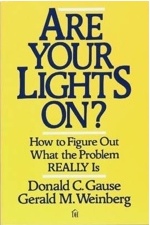"Are Your Lights On?" Book Writeup
April 05, 2013
 Are Your Lights On?: How to Figure Out What the Problem Really Is
Donald Gause, Gerald Weinberg
ISBN: 0932633161
Are Your Lights On?: How to Figure Out What the Problem Really Is
Donald Gause, Gerald Weinberg
ISBN: 0932633161
What’s the point?
Engineers love problem solving. We love coming up with solutions. We are
fascinated by juicy problems, ones that stretch our intellect as we formulate
a fix.
However, if we rush in with solutions before we correctly define the problem (and who the client we are trying to satisfy), we will end up solving the wrong problem. By stopping and thinking before diving into implementation, we can avoid this costly mistake.
Most of time, we are tasked with solving the problems of others, not ourselves. Making a mental shift from “Problem Solver” to “Solver of Problems” allows us to focus on finding who is impacted by a problem and identifying the real story behind the problem. There is rarely one problem that can be solved, but rather multiple parties that must come to a mutually acceptable resolution.
How was it?
The book uses stories to help answer the following questions:
- What is the problem? Whose problem is it? Where does this problem come from?
- Do we really want to solve this problem?
There are a lot of really eye-opening lessons. One in particular was very topical for my current project:
Don’t mistake a solution method for a problem definition — especially if it’s your own solution method.
There are some interesting ideas that I think will make their way into my “problem vocabulary”:
- Phantom problem - a problem is a difference between how something is desired vs how it is perceived; a phantom problem is often attributed to perception, you can change the perception to solve the problem
- Misfit - a solution that superficially solves the problem, but is not usable for those that have to live with it; try to identify these before implementing a solution
But the most influential section to me was on forcing yourself to consider that sometimes you are the source of the problem. If you can shift the source to yourself, you have complete control over resolving it — it won’t solve the problem for everyone, but you can go about your life without letting it affect you anymore.
Who should read it?
I found this book on David Heinemeier Hansson’s list of five most influence
programming books and I am really glad I read it. It is a short book
— I finished it in two sittings — and I would recommend it to anyone
dealing with arguments about solutions or confusion about problems.
